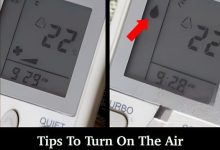Remove the Food

First things first: Toss any old or expired food into the trash. Remove the food that is still good and place it into a cooler with ice to keep it cold while you clean the remainder of the refrigerator.
Remove Shelves and Drawers

Take out all removable drawers and shelves and set them aside. Drawers and shelves that are made of metal or plastic can be washed with hot water and dish soap right away, but glass and ceramic pieces need to gradually warm up to room temperature before being washed with hot water to prevent cracking and breaking.
Wipe Down Refrigerator Interior
Use a clean cloth with hot water and mild dish soap. Work from top to bottom to prevent dripping on surfaces that are already clean. Tough stuck-on spills may need a plastic, non-abrasive scrubber, though another option is to lay a warm wet cloth over the spilled area for a few minutes. Then, the spilled area will be softer and easier to wipe away.
As you’re cleaning, rinse the rags that you’re using thoroughly or use multiple rags to ensure cleanliness. Pay special attention to the bottom crevices and back of the refrigerator where spills tend to migrate. Finally, wipe down the interior doors.
Clean Shelves and Drawers

Now that your shelves and drawers have had time to warm up gradually, take a few moments and clean and dry them thoroughly. Be careful, especially when handling slippery glass shelving. Dishwashing gloves may be helpful to prevent breakage.
Dry the Interior of the Fridge
Using a clean dry cloth or towel, wipe down the interior of the refrigerator to make sure it is completely dry. Don’t forget to dry the interior doors as well.
Replace the Food

Put the food back into the refrigerator. Now is also a good time to wipe off any jars or containers of food that may need it, such as a sticky jelly jar or a crusty salad dressing lid. Take care to use clean cloths when working with your food jars and dry them thoroughly as well.
Clean out the Freeze
Use the same methods listed above to clean out a freezer. The great thing about freezers is that they rarely have spills and need to be scrubbed out much less often. You may need to only check for and remove expired food. If the freezer does require more thorough cleaning, you can use the same methods used in the refrigerator.
Clean the Outside
Starting from the top, wipe down and clean the exterior of the refrigerator using hot/warm water and mild dish soap. If you have a stainless steel refrigerator, you’ll need to use a soft non-scratching rag and vinegar or a window cleaner to keep the surface shiny. Don’t forget to clean the rubber gasket seal around the edges of the door using dish soap and warm water. Dirt and grime can collect here and cause the seal to crack.

Seasonal Chores
You should clean out your refrigerator approximately once a month. However, there are a few chores that only need to be done every few months.
- Check the Drip Pan: Some refrigerator models have a removable drip pan that collects the condensation from the refrigerator. Remove the grill from the bottom front of your refrigerator and use a flashlight to locate the drip pan. It will be on top of the condenser coils. Drip pans can become moldy over time, so wear gloves and be prepared. Remove the drip pan and clean thoroughly before replacing it. You may need to use bleach. When in doubt, refer to the manufacturer’s instructions and follow them. Dry and replace the drip pan and front grill.
- Vacuum the Refrigerator Coils: Unplug the refrigerator and move it out from the wall carefully and slowly. For models with the coils on the back of the refrigerator, use the brush attachment to vacuum the coils. Some side-by-side and built-in models may have coils located behind a vent on the top, bottom or back of the refrigerator. Some models even have vents screwed on over the coils. On these models, you’ll need to use a long narrow crevice attachment for your vacuum cleaner. Refer to your owner’s manual for assistance. Put the refrigerator back and plug it back in.







